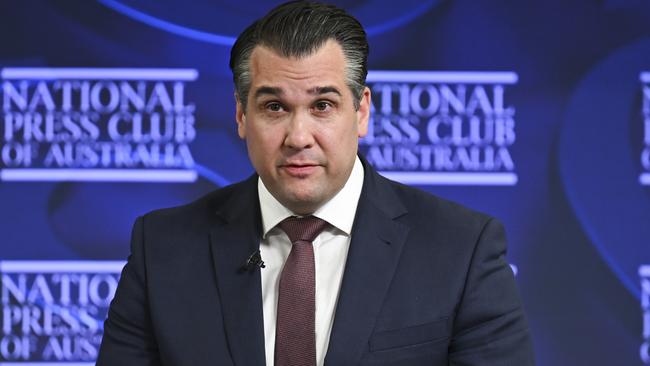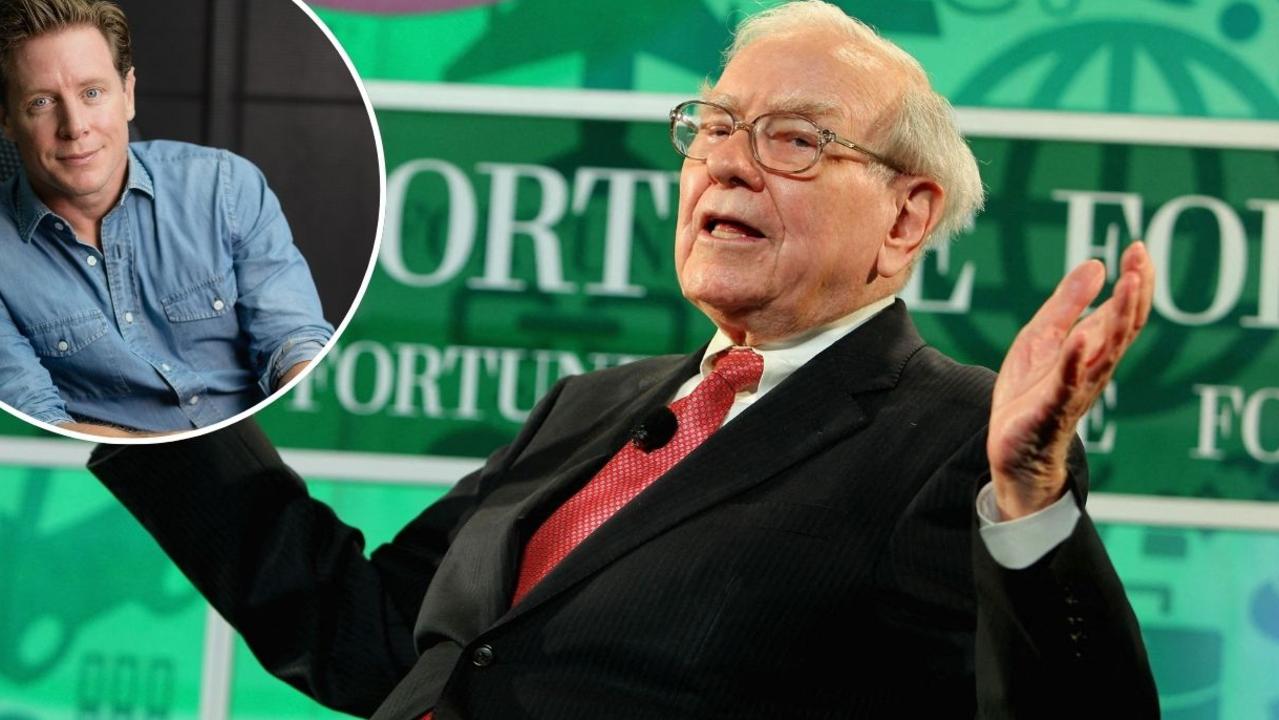Trump’s tariffs have caused market mayhem but don’t let fear win, says Barefoot Investor
Trump’s tariffs have sent stocks tumbling, but history favours the patient investor. Here’s why staying the course beats panic-selling, according to Barefoot Investor.
Barefoot Investor
Don't miss out on the headlines from Barefoot Investor. Followed categories will be added to My News.
It’s 5am.
I’m at the farm, sitting here at the kitchen table, staring at my screen … and watching the US stock market get absolutely hammered. It has plummeted close to 5 per cent since I went to bed last night, in response to Trump’s ‘Liberation Day’ tariffs.
Journalists and media pundits absolutely live for days like this. There are so many ‘bloodbath’ headlines. So much clickbait casserole. So much ‘breaking news’.
And every article is saying pretty much the same thing: Trump’s tariff plan is stupid. That it will plunge the US economy into a deep recession. That it will have devastating impacts around the world.
Scared yet?
Look, it makes total sense that you may be thinking to yourself:
“This is a really uncertain time to be investing. None of this sounds good. Maybe I should just sell my shares and move my super to cash until this clears up.”
Well, let’s talk about that.
I have a coffee in my hand. The kids are still asleep. It’s just you and me. Today I’m going to tell you what I plan on doing with my own money. But, before I do, let me give you my take on the Trump tariffs.
First, this is not meant to be sound (or sane) economic policy – it’s a negotiating strategy. Trump views the world in terms of winning and losing, and he wants every country on earth to lose, so that he (and America … but mostly he) wins.
Second, and even more importantly, he’s just told every American that the global system is rigged, and that America is being unfairly treated.
Now, I don’t think that’s true. In fact, since World War II, free trade has lifted more people out of poverty than at any other time in history. Yet facts don’t matter.
Besides, this line of argument gives Trump someone to blame when the economy tanks: he had the guts to stand up to the global bullies – it’s their fault, not his.
Third — and let’s be honest, most predictably — he’s keeping the world’s attention glued to him like a toddler with a tambourine.

So, back to you.
You’ll hear people say that now is a very ‘uncertain time’ to be an investor.
Yeah, nah.
The truth is that it is always an uncertain time to risk your money. If you think it’s safe, you’re simply not paying attention. However, what history teaches us is this: the price you pay for earning long-term life changing compound gains is having to stomach short-term uncertainty.
And here’s the thing about trying to protect yourself in the share market: you don’t just have to be right once – you have to be right twice. First, you’ve got to guess when the market will fall further. Then you’ve got to guess the exact moment to jump back in. And spoiler alert: no one rings a bell when it’s safe to invest again. (Just ask the people still waiting to buy back in after the Covid crash.)
So what should you do instead?
Simple. My advice hasn’t changed since I wrote The Barefoot Investor.
If you’ve got a home loan, focus on boosting your super contributions to 15 per cent and pay off your mortgage like your future depends on it – because it does. That’s the plan. Boring? Maybe. But it works.
Then, in the final three years before you retire – whatever age that is for you – consider getting your super fund to invest your future employer contributions in cash. The goal is to build up a buffer of three to five years’ worth of living expenses (after any pension payments you may receive), so when the market drops you don’t have to stress or sell. You’ve got time on your side.
As for me? I’ve paid off the home loan. So every month – rain, hail, or full-blown Trump tantrum – I throw money into three low-cost index funds. The louder the noise, the cheaper the shares.
Tread Your Own Path!
The Dim Sim of Australian Politics
Hi Scott,
I’m 32, a teacher, and renting with my boyfriend (also a teacher). We’re working hard and saving where we can, but the idea of owning a home in Melbourne still feels out of reach.
We don’t have rich parents or guarantors – my mum also rents, and my partner’s parents are still paying off their home. I was doomscrolling property news (as you do) and saw an article quoting a speech by Opposition Housing Minister Michael Sukkar and the Liberals’ plans to ease lending rules to help buyers without the Bank of Mum and Dad. You’re the only finance person I actually trust – does this mean anything for people like us, or is it just pre-election noise?
Penny

Hi Penny,
Michael Sukkar is the Dim Sim of Australian politics – hot on the outside, cold in the middle – and his ideologically driven policies are a weird mix of soggy cabbage and mystery meat that will make you chunder.
Here’s the soy sauce:
When you apply for a home loan, the bank checks if you can afford it even if interest rates go up.
Right now, the government regulator makes them add 3 per cent to the current rate – just to be safe.
So if the rate is 6 per cent they test whether you could still make repayments at 9 per cent.
It’s called a ‘stress test’ – and it’s there to stop people getting in over their heads if (or, let’s be honest, when) rates rise. And, as a financial counsellor, I think it’s a thoroughly sensible policy that keeps the screws on bankers.
Dim Sim disagrees.
He argues that by lowering the buffer first home buyers would be able to borrow more. Which is true.
But let’s think about it for, say, six seconds:
Lowering the buffer would mean everyone could borrow more – so they would – and all that would do is drive up housing prices even further.
Sukkar’s plan is like eyeing off the last rubbery dim sim that’s been sitting in the servo steamer since last Sunday. Penny, I know you’re hungry, but if you swallow what Sukkar is selling, well, just make sure you have a hazmat suit handy, a toilet roll in the freezer, and a plumber on standby.
(For the record, I have been equally unimpressed by Labor’s ‘Help to Buy’ first home owners scheme.)
Our First Marital Spat
Hey Barefoot!
My husband and I have had our first marital spat. Ironically, over whether to insure my engagement ring. He knows that I’m pretty hopeless with my belongings, but now after four years of not losing it I’ve made a case to reallocate the $550 annual insurance fee elsewhere. Please mediate and help us decide whether to insure or not to insure!
Sarah

Hi Sarah
You’re insuring a ring for $550 a year?
It must have so many carrots the Easter Bunny has put it on his wish list.
Now I’m sure you understand this, but you’re fighting about something that is purely emotional. It’s not logical to wear the price of a second-hand HiLux on your finger ... but hey, no judgement.
Welcome to marriage!
Most home and contents insurance policies already cover your ring – but only up to a certain amount, often just $1000. If your rock’s worth more (say, $10,000), you’ll need to specify it on your policy and cough up for the higher premium. That means getting a valuation certificate and jumping through a few hoops. It sounds like that’s what you’ve done.
Now, let’s get practical.
If you rarely take the ring off, and don’t live in Purf, there’s a very good chance you’ll never lose it.
However, let’s look at the worst case scenario and you do lose it.
You’ll feel terrible. Your husband will be angry (and he’ll very likely use it as ‘exhibit A’ in any future fights you have).
Will you rush out and buy the exact same ring?
Maybe.
Will replacing it make you feel better?
I don’t think so. That’s a sunk cost – both financial and emotional.
My advice?
Save the insurance money. Instead, each year spend that money on booking a cheeky Airbnb, share a bottle of red, and toast to a lab-grown diamond if the worst happens. Cheaper, shinier, and no ethical guilt. And remember: the size of the rock has nothing to do with the strength of your marriage. (But correctly stacking the dishwasher? That’s another story.)
DISCLAIMER: Information and opinions provided in this column are general in nature and have been prepared for educational purposes only. Always seek personal financial advice tailored to your specific needs before making financial and investment decisions.


